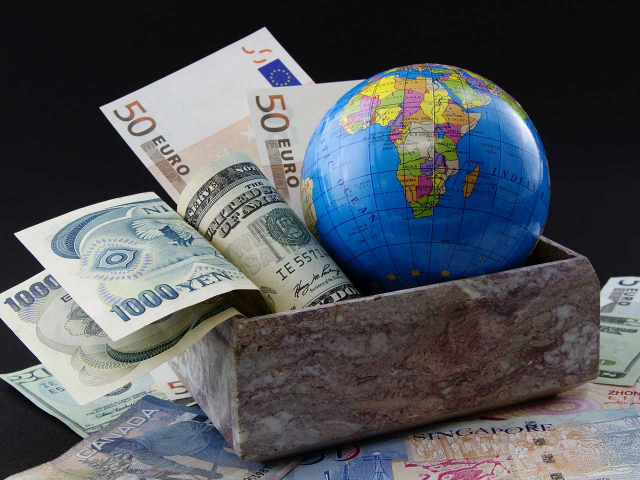
Using a scale of 1 to 25, the EIU made a ranking of potential destabilizing events. The risk strength includes the probability of event and the degree of its negative impact: from very low (0-10%) to very high (more than 40%). More details are in our photo gallery

Long-term decline in major stock markets
The risk strength is 15: the average probability, a very strong influence
The logic of the development of the world economy is that more and more central banks will dismantle monetary incentive programs and raise interest rates. This will lead to a boom in the stock markets, increasing uncertainty for market participants, and to sharp volatility spikes, etc. Such a scenario will destabilize the global economy, lead to a deterioration in the financial position of banks, consumer confidence in which will be undermined.

The decline in the global trade as a result of US protectionist policy
The risk strength is 15: the average probability, a very strong influence
The highly probable exit of the US from the North American Free Trade Agreement (NAFTA) and the restriction of the import of products from China will negatively affect the prices and the availability of American and Chinese products in the supply chains of companies from other countries, that will lead to a reduction in investment and consumer spending, and to a general decline in world economy.

Territorial disputes in the South China Sea
The risk strength is 12: the average probability, strong impact
Geopolitical tensions in the South China Sea threaten military clashes between China and a number of Asian countries, which could lead to irregular supply of sea cargo. At the same time, the China's increasing activity in the international arena coincides with a decrease in the role of the United States, ensuring the safety of maritime routes.

The growth rate of the global economy will exceed 4%
The risk strength is 12: the average probability, strong impact
The acceleration of the world economic growth above 4%, to the level of 2010, will be a positive consequence of further business growth in a number of large and developing countries. In addition, the growth of the world economy will launch a reorientation of the Chinese economy in the long term. The prices for raw materials will be supported by a higher demand, which cannot but affect the economic situation in the exporting countries.

Large-scale cyber attack
The risk strength is 12: the average probability, strong impact
Given the pace of the development of modern Internet technologies that you cannot exclude such phenomena as cyber attacks which may well disrupt public or corporate networks, thereby limiting the activity of companies and public authorities. Last year there were WannaCry and Petya viruses, and one can assume with great probability that in the case of real cyberwars economic losses will be much much larger.

Long-term economic slowdown in the PRC
The risk strength is 10: low probability, very strong influence
The increasing debt of China cannot but lead to the thought of the possibility of an economic recession in the country, that will provoke a pretty serious and long-lasting financial and economic crisis throughout the world. In such a situation, Beijing will find it difficult to maintain control over the economy.

Major military actions on the Korean peninsula
The risk strength is 10: low probability, very strong influence
Tougher than of the previous US president, Donald Trump's line on North Korea is related to the progress of the DPRK in the development of nuclear weapons and ballistic missiles which can reach the territory of the United States. The degree of tension in this region periodically increases to the point that threatens terrible consequences for the neighboring states - South Korea and Japan.

Conflicts in the Middle East
The risk strength is 10: low probability, very strong influence
Direct confrontation between the major countries of the Middle East (Saudi Arabia and Iran), exacerbated during the war in Syria and Yemen, cannot but hit the world energy markets. The situation is aggravated by the interference of Turkey, with the result that the confrontation between different players can degenerate into a violent conflict and lead to irregular oil supply and price strike that will hit the global economy.

The breakdown of the OPEC+ agreement
The risk strength is 9: the average probability, the average impact
If the implementation of the OPEC+ agreement is undermined, that is realistic given the general reluctance of its members to continue reducing oil production and the current growth of political tension in the Persian Gulf, the falling prices for black gold is imminent, as about 2 million barrels a day will come back to the market. This will primarily hit the US and Canada, as well as provoke a debt and political crisis in several African countries.

The exit of countries from the euro area
The risk strength is 5: very low probability, very strong impact
Following Greece, which is more likely to emerge from the eurozone in the medium term, Italy can also leave the European community, where the absence of structural reforms leads to serious economic problems.
Even in the case of a gradual emergence of crisis-affected countries from the euro area, the devaluation of their currencies will intensify until it leads to the inability to service the euro-denominated debt. All this can overthrow the world economy into the trough of a recession.
 বাংলা
বাংলা 
 Русский
Русский English
English Bahasa Indonesia
Bahasa Indonesia Bahasa Malay
Bahasa Malay ไทย
ไทย Español
Español Deutsch
Deutsch Български
Български Français
Français Tiếng Việt
Tiếng Việt 中文
中文 हिन्दी
हिन्दी Čeština
Čeština Українська
Українська Română
Română
